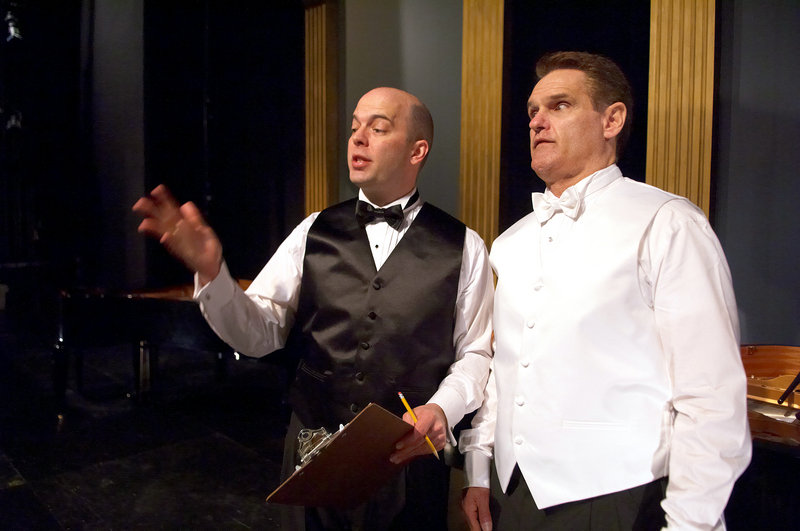The play “2 Pianos 4 Hands” tells the story of two aspiring musicians who grow up with the piano as the focal point of their lives.
As they reach adulthood and discover they don’t have the chops to make it professionally, they question whether they’d want to even if they could. In an extreme scenario, the piano becomes an object of derision and represents something to be loathed.
“The first time I saw it, I was just so moved by it, because what I had done in my life mirrored what the real Ted and Richard had done in their lives,” says Tom Frey, who stars in a production of the show opening this week at Portland Stage Company.
“I quit playing at age 17 and went into acting school. At some point along the way, I had developed a crippling fear of playing the piano in front of people, so I went to acting school instead.”
Frey has been associated with “2 Pianos 4 Hands” for more than a decade. He has performed in it hundreds of times. In addition to starring in this production with Jeffrey Rockwell, Frey also directs. For the Portland show, the two men reprise roles that each played last fall in Peterborough, N.H.
“2 Pianos 4 Hands” is a phenomenon, one of Canada’s best-known cultural exports. Musicians Ted Dykstra and Richard Greenblatt wrote the play about their common experiences growing up around the piano. They premiered it in Toronto in 1996, and a year later it moved to New York.
More than 150 theaters have produced it, and it has been translated into three languages and performed on five continents.
For many years, Dykstra and Greenblatt performed the show themselves. They have since recruited a few other actors to play the parts, but it’s a select few. The roles demand that actors be fully adept at playing the piano.
“It uses every single tool that you have in your tool belt as an actor and as a musician,” says Rockwell.
It’s a two-person show, although the actors portray 20-plus characters, including pushy parents and demanding teachers.
They tell the stories of their lives as they meet at competitions and reconnect at events over the years. In a larger context, the story is about dreams and how the path people take to achieve them shifts and bends.
This story uses the piano as a metaphor for hopes and dreams. It could just as easily be tennis or dancing.
Frey understands the pressure that ascending musicians face. During the height of his progression as a pianist, he practiced six to seven hours a day. The piano became his most important focus, and was nearly all consuming.
He eventually walked away. For 10 years, he barely played at all. “I had a bad break-up with the piano,” he says.
Then one day, his agent noticed a line on Frey’s resume — an afterthought, really. It said, “Plays piano.”
She told him about “2 Pianos 4 Hands” and advised him it might provide an outlet for steady work. The originators were seeking replacements, and Frey might be a candidate if he sharpened his piano-playing skills.
Frey surprised himself when he showed up for the audition.
Preparing for the role means full immersion into the life of a pianist. Each of the two parts demands an actor first and a musician second, but the show’s success hinges on musical harmony between the actors.
The show involves the performance of a great variety of music, and it culminates with the first movement of Bach’s Concerto in D minor, with both pianists playing.
It’s a demanding piece, and must be performed seriously. These guys really do play — and play well.
For Frey, success at “2 Pianos 4 Hands” has meant conquering deeply held personal demons. As a young man, the discomfort of performing live forced him to walk away from music. Now he’s on stage at the piano two hours every night.
Rockwell experienced less trauma with the piano as a youngster. He began lessons at age 9, and continued to study performance through his early 20s. He never harbored dreams of becoming a concert pianist; he simply stopped playing seriously.
Each time he does “2 Pianos 4 Hands,” he’s impressed with the depth of the characters and the abilities of the play’s writers to make them as real as possible.
“They put everything of their lives in these parts,” Rockwell said. “Thank God one of these guys wasn’t able to juggle chainsaws. They’d throw that in there too.”
Staff Writer Bob Keyes can be contacted at 791-6457 or at:
bkeyes@pressherald.com
Send questions/comments to the editors.




Success. Please wait for the page to reload. If the page does not reload within 5 seconds, please refresh the page.
Enter your email and password to access comments.
Hi, to comment on stories you must . This profile is in addition to your subscription and website login.
Already have a commenting profile? .
Invalid username/password.
Please check your email to confirm and complete your registration.
Only subscribers are eligible to post comments. Please subscribe or login first for digital access. Here’s why.
Use the form below to reset your password. When you've submitted your account email, we will send an email with a reset code.